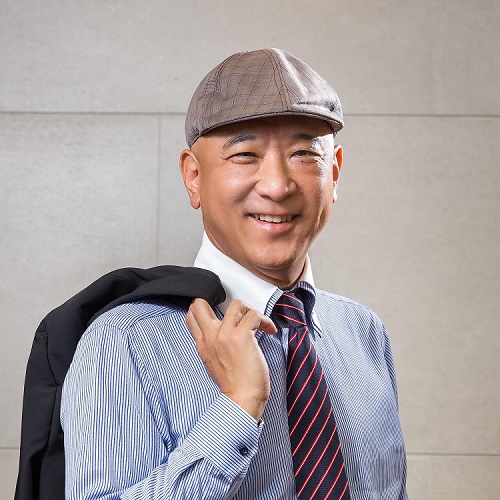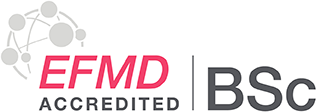Guest professor Pin Luarn at Business School Pforzheim
News

“For me, teaching is about guiding students to discover and maximize their potential, a process that brings me great joy and fulfillment” – Guest Professor Pin Luarn from Taiwan Tech's School of Management.
Professor Pin Luarn from Taiwan Tech's School of Management has dedicated 31 years to teaching and global work. He has received multiple Taiwan Tech excellent teaching awards and was ranked among the top 2% of scientists globally in the 2022 Stanford University Scientific Influence Rankings. This year, he was honored with the National Excellent Teaching Award.
Professor Luarn specializes in e-commerce, online marketing, and artificial intelligence, and has published numerous highly-cited papers. He has mentored over 200 master’s and doctoral students and played a key role in helping several companies go public, including Taiwan’s first listed e-commerce company, significantly advancing the e-commerce sector in Taiwan.
As a former Dean and EMBA Executive Director, Professor Luarn has guided students to multiple national championships in case competitions. Professor Luarn’s teaching philosophy centers on fostering innovative thinking and global mobility in students, aiming to shape socially responsible global citizens.
Thank you for taking the time for this interview. I understand this isn’t your first visit to our campus in Pforzheim. It’s great to have you back here.
Thank you! That’s correct – this isn’t my first time in Pforzheim, and I’m delighted to be back.
Since you are already familiar with our campus and its atmosphere, can you think of three words that come to mind when teaching at our university?
The first word is friendly. Everyone here – both students and staff – is so welcoming and kind.
The second is hard-working. The students are very eager to learn, and they work diligently during class.
The third word would be cold. I arrived at the end of October, and while the first few days were sunny, it was already quite chilly. The sunsets over the river, however, are stunning. After classes, I often take walks with my wife, who is here with me. The town and its surroundings are beautiful. We even visited Strasbourg – the old town, the cathedral, and the Christmas decorations there were truly impressive.
What were you most looking forward to experiencing again when you returned to Pforzheim?
I’m very familiar with the environment here and simply enjoy teaching. The students are very attentive, and I can see in their eyes that they’re genuinely trying to learn from me. Teaching such motivated students is a real pleasure.
In your opinion, what are the main differences between Pforzheim University and your university at home?Pforzheim University is relatively small, which gives it a close-knit, family-like atmosphere where everyone seems to know each other. It’s very warm and friendly.
The university I work at is a bit larger but also highly international. Here in Pforzheim, there is a wonderful mix of students from Asia, India, China, Taiwan, and European countries, creating a rich environment for cultural exchange.
One small cultural difference I noticed is that students in Taiwan applaud after class, while here they knock on the tables. The first time I experienced that, I didn’t know what was going on and thought they might not be happy with my teaching! I eventually learned that knocking on the table is the students‘ way of expressing their appreciation for my class. It’s little things like this that stand out when you teach in a different country.
You are teaching a course on “Introduction to Artificial Intelligence” here in Pforzheim. What sparked your interest in this field?
My interest in AI started about 35 years ago when I was a PhD student in Wisconsin, USA. I first learned about artificial neural networks back then. However, computing power at the time was very limited, so it took an eternity to model decisions. Around ten years ago, with more powerful computers, these models became practical for real-world applications. Six years ago, I began using them to solve marketing questions, such as analyzing consumer behavior.
Today, we use tools like cameras and internet data to understand customer feedback and emotions. In my class here in Pforzheim, I teach 28 students how to work with large language models. MBA students, in particular, need to know how to use these tools and where to find resources to conduct analyses effectively.
How do you view the impact of AI on human productivity?
AI doesn’t make people lazy; it boosts productivity. It doesn’t take jobs away—it elevates them to a new level. AI is a powerful tool, much like the tools humans have been using throughout history to enhance their capabilities. However, if used mindlessly, it can lead to complacency. When used thoughtfully, it empowers you to achieve more, freeing up time for critical thinking and analysis.
The results AI generates can range from remarkable to nonsensical. It’s up to the user to refine inputs, guide the model, and ensure it meets their needs. Large language models, for instance, are designed to predict the next word—they don’t inherently understand logic. As a user, you need to clarify your objectives and fine-tune the output. While these tools are constantly improving and becoming more powerful, they don’t replace human thought—they require it.
Users must be cautious, outsmarting the model and leveraging it strategically. This approach encourages ongoing critical thinking and innovation. However, privacy concerns are another issue to consider, taking into account how these models are trained and the data they rely on. That’s a broader, important conversation.
In your opinion, how is AI transforming the role of managers and leaders in today’s world and why is responsible regulation important for its use?
AI is still in its infant stage, especially considering how recently tools like ChatGPT have gained widespread popularity. Its impact will be profound, influencing nearly every aspect of life and work. We need clear rules and regulations to harness its potential responsibly. Like any powerful tool, AI can be both incredibly beneficial and potentially dangerous.
For example, we have extensive regulations for operating cars safely, and similar rules are essential for AI. If used within a framework of well-thought-out regulations, AI can become a highly effective tool. Right now, global efforts are underway to develop better ways to govern and limit AI’s use, which is both essential and timely. Without these safeguards, AI could become uncontrollable—much like an untamed animal or a car with a dangerously powerful engine. Establishing and following clear rules is crucial to ensuring its safe and productive use.
The key is to use AI wisely. AI can take over certain tasks, but the critical thinking must always come from humans.
What do you love most about your job?
I’m fortunate to teach a diverse range of students, from 18-year-old undergraduates to 50-year-old executive MBA participants. Each group has its own needs, and adapting my teaching methods to suit them is both challenging and rewarding. I also attended teaching workshops at Harvard University, which helped me refine my techniques. After 31 years of teaching, I feel I can understand students’ needs well, and that makes every day in the classroom enjoyable.
Do you have a final piece of advice for students aspiring to work in AI or management?
As Steve Jobs once said, “Stay hungry.” Always be curious and learn something new every day. Absorb knowledge like a sponge, but also learn how to process and apply it. Not everything you learn will be useful, but keeping an open mind is essential. This mindset keeps you energized and ready to embrace new challenges.
Thank you so much for the interview! Is there anything else you’d like to add?
I’d like to thank everyone who made my teaching experience here possible – especially the ISP team, Jochen, Uta, and Rebecca. Their support has been amazing, and I’m impressed by how efficient and welcoming everyone is.
I would also like to thank Professor Dr. Thomas Cleff. We have been friends for nine years now. We’ve connected through AACSBS and EFMD accreditation events, attending the same annual conferences. We’d meet two or three times a year and developed a strong friendship. Thomas kindly invited me to teach in Pforzheim, and it’s been a pleasure to be here. Thank you!
The National Taiwan University of Science and Technology was founded on August 1, 1974, as the National Taiwan Institute of Technology (NTIT). It was the first higher education institution of its kind within Taiwan‘s technical and vocational education system. It is now a leading academic institution focused on providing high-quality education in business and management. It offers a wide range of programs, including undergraduate, graduate, and executive education, with a strong emphasis on practical skills, innovation, and global mobility. The school is known for its outstanding faculty, research contributions, and close ties to industry, preparing students to become responsible, effective leaders in the business world. It has a reputation for excellence in e-commerce, online marketing, and business technology.


